
Welcome to  , the Butler Way!
, the Butler Way!
The past 16 months have been a trying experience for our communities, economy, and country. The United States specifically was sharply divided by conflict between personal liberties and collective safety, episodes of civil unrest reflecting collective distrust of authority, and the prospect of moving the economy forward under a rapidly redefined (and still evolving) concept of work.
Post-COVID, we are faced with an incredible challenge to reflect on both new and old questions that now demand answers. While these discussions won’t necessarily include representatives of all sectors and generations, we believe education is historically and functionally well-positioned as a venue to lead the response to our country’s calls for change.

Warning against the potential for tyranny of government unless “the people at large were educated at the common expense of all”, Thomas Jefferson advocated for a publicly underwritten school system. John Adams later would declare into the Massachusetts Constitution of 1780 that “wisdom and knowledge… diffused generally among the body of the people [are] necessary for the preservation of their rights and liberties.” Schools were endowed from our nation’s earliest days with the opportunity and responsibility to prepare our nation’s children with the tools necessary to intellectually defend their claims on liberties, but also to secure for themselves and their compatriots the most bountiful social and economic commonwealth possible.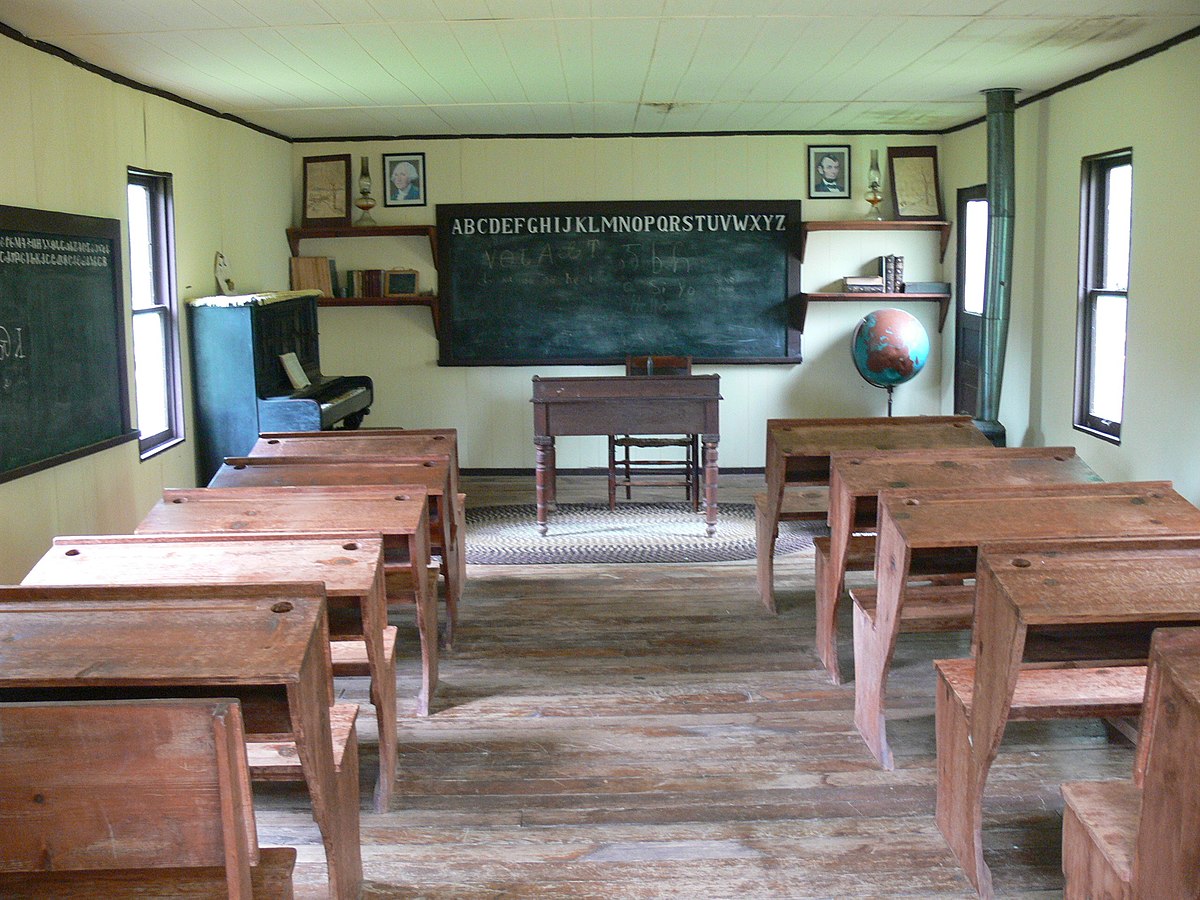
In their earliest days, early American schools faced this burden by providing a classical education reflecting the social and economic demands of the times with instruction stressing philosophy, reading, writing, penmanship, arithmetic, and languages, especially French. The young men and women who were fortunate enough to be permitted to attend schools for the first century of our nation’s history were generally equipped for civic engagement as well as the demands of a “virtuous” life.[1]
Following the industrial revolution, however, the prerogatives of 20th century educators had shifted to a model that more closely resembles our contemporary classrooms. Curriculum, delivery, and standardization represented a compromise between “public educators, industrial trainers, and old humanists” preparing for diverse needs in a newly industrialized North, but driving toward a society that is comprised of “an instructed and intelligent people…[who] are always more decent and orderly than an ignorant and stupid one”.[2][3]

As our education system faces the prospect of undoing the trauma of a global pandemic, restoring civil discourse within our communities regarding the role of government in the lives of its constituents, and preparing workers to add value during a new industrial revolution brought about by the proliferation of robotics, advanced computers, and artificial intelligence, we would like to provoke conversation about what a new paradigm of learning and leading in the coming years might entail. 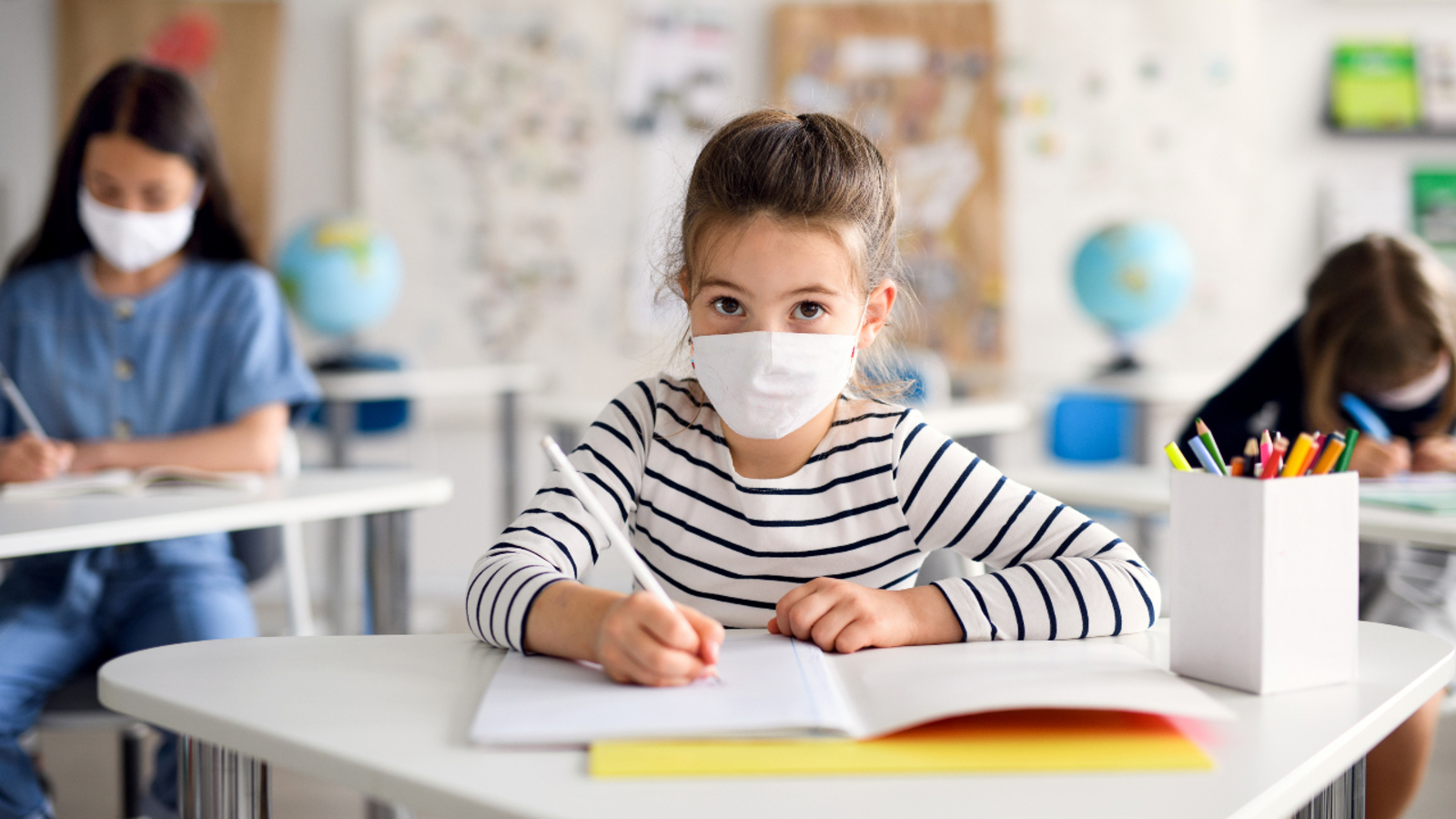
To be ![]() is central to our schools’ expressed charge of preparing our youth with what will be demanded of them personally and professionally throughout their lives. While the details of the future are unclear, a number of themes are already emerging that make it possible to meaningfully focus on the demands that learners and leaders will face.
is central to our schools’ expressed charge of preparing our youth with what will be demanded of them personally and professionally throughout their lives. While the details of the future are unclear, a number of themes are already emerging that make it possible to meaningfully focus on the demands that learners and leaders will face.

Learning in the new, Post-COVID era has gotten off to a bumpy start. As we look ahead to a view of proficiency that shifts attention from the zero-sum concept of mastery toward portfolios of competencies, the most obvious demand of ![]() learning will be resilience.
learning will be resilience.
“Because life is not predictable. It is full of many challenges and it is important for kids {and adults} to be able to handle these challenges in order to learn, grow, and solve problems. If we don’t persevere, we stand still. And if we aren’t resilient we are stressed, defeated, and argumentative when faced with every obstacle that comes along.” [4]
Further, the proximate skills of reflection, empathy, cooperation, and communication appear relevant to the long-term economic and social interests of our nation as well.
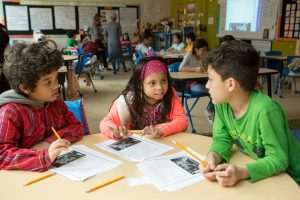 Communication is front and center for what we need to do in order to educate our students to be ready for the workforce. There are several other factors such as compassion, empathy, and ethics, but communication needs to be front and center.[5]
Communication is front and center for what we need to do in order to educate our students to be ready for the workforce. There are several other factors such as compassion, empathy, and ethics, but communication needs to be front and center.[5]
“Interpersonal skills: Include content that focuses on interpersonal emotional intelligence, including empathy, cooperation, negotiation, leadership and social awareness. [6]
By impressing upon learners the importance of cooperation, communication, understanding, self-awareness, and reflection en route to displays of proficiency, we create a sense of community that prepares future employees the means necessary to leverage the skills and perspectives of their colleagues.

A more socially-sophisticated and prepared populace places new demands on leaders as well, to be thoughtful stewards of their organizations’ missions and the needs of their teams. As the worlds’ economies and societies needs continue to evolve, the pressure will build on our leaders to provide the sort of direction that provides for the common benefits that our founding fathers thought possible. With the recent renaissance of the whole child, Class DisruptED host Michael B. Horn suggests that considering individuality to paves a clear path to reinforcing the collective.

This is both appropriate given the historical context of the COVID-19’s wake, but also as means to create long-term change to benefit schools and students in the future, as they prepare for a changing paradigm of work.

When considering the holistic needs of any team or organization–as a system of parts that all need individual attention to perform at their best–we are playing into exactly the work that is future-proof and guarantees a positive trajectory, tapping into the capacity that Dr. Jamie Merisotis would say makes us human.

Emphasis on individual and human well-being of students puts us in the driver’s seat of ![]() systemic change. Learning 2025, the holistic shift that AASA is calling for, puts forth some very clear expectations for what the outcomes should look like within schools.
systemic change. Learning 2025, the holistic shift that AASA is calling for, puts forth some very clear expectations for what the outcomes should look like within schools.
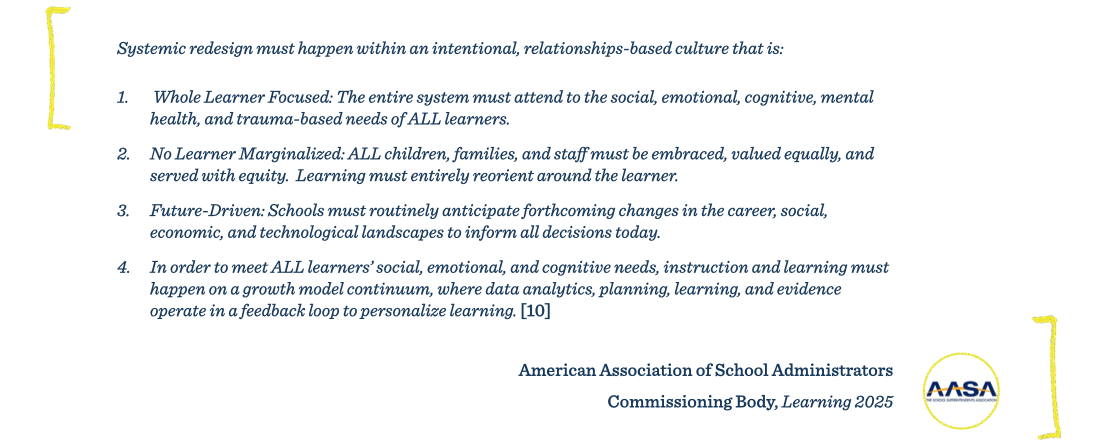
In order to address the next steps for the company, their employees, and for themselves, leaders must do a few key things to position themselves to empower their teams for a stronger tomorrow:
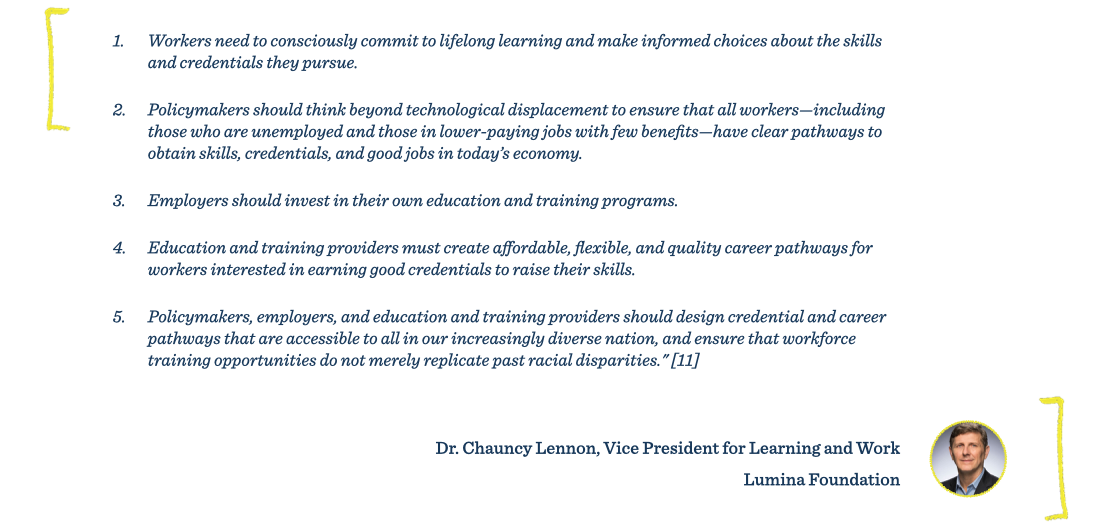
In short, leaders need to avoid the comfort of previous habits and courses of action to remain truly ![]() .
.

To promote discourse about what it means to be ![]() as learners and leaders, Butler EPPSP Cohorts 39 & 40 have organized this website into two distinct domains to complement and extend a week of learning between June 21-24.
as learners and leaders, Butler EPPSP Cohorts 39 & 40 have organized this website into two distinct domains to complement and extend a week of learning between June 21-24.
The Butler Way Leadership Academy includes a look at seven crucial dimensions of ![]() learning in the 21st Century, including:
learning in the 21st Century, including:
- Critical Thinking, Problem Solving, & Decision Making
- Curiosity & Creativity
- Human Skills
- Imagination & Innovation
- Resilience & Perseverance
- Diversity & Inclusion
- Information & Digital Literacy
These posts each feature a lesson plan and presentation materials designed to engage K-12 learners in conscious exploration of these features and the benefits they provide.
The Future Focused Leadership Conference, open to political, education, business sector, and community leaders, revolves around three thought-provoking publications that challenge the current notions and interplay of leadership and learning in our country’s future.
- Learning 2025
- Human Work in the Age of Smart Machines
- Class DisruptED
Thank you to our the participants in the Butler Way Leadership Academy, our keynote speakers for the Leadership Conference, and to the Lumina Foundation for their beneficent support of this project. Without their expertise, time, and energy, none of this would have been possible!
While we welcome free and fair use of these resources, we also present these sessions and materials as food for thought, and we welcome feedback and discourse about the implications of these ideas within our schools and society writ large. Please feel free to add your thoughts and reactions to these ideas in the comments section of the website!
Thanks for your time and ![]() consideration,
consideration,
![]()
![]()
Patrick Kennedy & Caroline Rico
Future Focused Steering Committee, Group 40

- https://www.k12academics.com/history-education-united-states/colonial-era
- Williams, R., 1961. Culture and Society y London: Chatto and Windus, 1958. R. Williams, The Long Revolution y London: Chatto and Windus.
- Carl, J., 2009. Industrialization and public education: Social cohesion and social stratification. In International handbook of comparative education (pp. 503-518). Springer, Dordrecht.
- “HOW AND WHY TO TEACH YOUR STUDENTS PERSEVERANCE AND RESILIENCE.” Socially Skilled Kids, 16 July 2020, www.sociallyskilledkids.com/blog/how-and-why-to-teach-your-students-perseverance-and-resilience.
- Merisotis, J. P. (2020). The Work Only Humans Can Do. In Human Work in the Age of Smart Machines (pp. 31–32, 53). RosettaBooks.
- World Economic Forum. (2020). Schools of the Future: Defining New Models of Education for the Fourth Industrial Revolution. World Economic Forum.
- Merisotis, J. P. (2020). The Work Only Humans Can Do. In Human Work in the Age of Smart Machines (pp. 31–32, 53). RosettaBooks.
- Horn, M. B., Tavenner, D., & Rose, T. (2020, June 22). Class Disrupted Podcast Episode 6: Help! My Children and I are overwhelmed! Class Disrupted. Retrieved May 23, 2021, from https://www.the74million.org/article/listen-class-disrupted-podcast-episode-6-help-my-child-and-i-are-overwhelmed/
- Horn, M. Tavenner, D. (2021, April 21.) Season 2, Episode 18: Behind the Federal Dollars Flowing to Schools. [Audio podcast] Class Disrupted. Retrieved from apple podcasts.
- An American Imperative: A New Vision of Public Schools. (2021). A Report from the Learning 2025: National Commission on Student-Centered, Equity-Focused Education, (April).
- Lennon, C. (2020, February 24). The future of work is already here. Policymakers need to get onboard. Lumina Foundation. https://www.luminafoundation.org/news-and-views/the-future-of-work-is-already-here-presidential-candidates-policymakers-and-employers-need-to-get-on-board/”
All research, synthesis, and compilation of these documents occurred between May 1 and June 24, 2021, in the midst of the COVID-19 pandemic. We understand the fluidity and constant evolution of this situation. Butler University’s Experiential Program for Preparing School Principals (EPPSP) is composed of graduate students who are current educational professionals who are striving to become building-level leaders and administrators. Students in this program were guided by experts in each of the fields of research. All information was researched during a five-week period of time, and is valid and current as of June 24, 2021.
